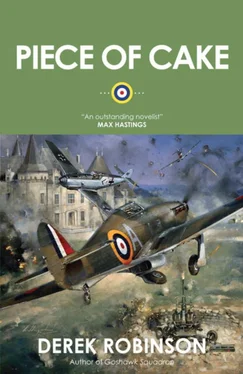“Okay, Mango Leader,” CH3 said. With Cox away, he was leading “B” flight. The squadron divided, “B” flight turning toward the escort; but immediately that happened, the Messerschmitts also divided. Half of them made for the Heinkels again.
“In and out fast,” Barton ordered. “Beat ’em up, shake ’em up, then back on top PDQ.”
They dived: three sections in line abreast, each wingman a few lengths behind his leader. When they leveled out, the leaders raced at the flank of the raid, fired, vaulted the outside bombers, climbed steeply away. Half a second later, the wingmen did the same. Bing Macfarlane clearly saw faces at the glossy, porpoise-like nose of one Heinkel, an upflung arm, a gaping mouth; then he boomed over the fuselage, snatching the bomber’s aerial with his tail-wheel. It was enough to make any pilot twitch; Bing himself twitched a little at the cat’s-cradle of tracer all around him; and several Heinkel pilots lost control. One began wallowing violently, like a dinghy in surf. Another wandered suicidally across the formation. A third started drifting back on the next bomber, but there was an excuse for that: his port engine was laying down a broad black carpet of smoke.
Barton checked the scene while his flight regrouped. A mile or two away, “B” flight was roaming around one group of Me-110’s. These had changed formation: now they formed a perfect circle, ten or a dozen planes chasing each other’s tails, endlessly. Extraordinary , Barton thought. Where’s that going to get them? Below him, the rest of the escort had reached the bombers and were zigzagging alongside in an effort to match their trudging speed.
“Same again, ‘A’ flight,” Barton called. “In and out fast. Don’t mix it.”
As the attack went down, two or three of the big Messerschmitts swung away from the raid. Lacking speed, they were more cumbersome than ever. The Hurricanes swept past them, stormed into the Heinkels’ flank, soared away to safety. Craning his neck to look behind, Barton saw heavy flak bursting a few hundred yards ahead of the bombers. As he leveled out, they were rocking and bouncing wildly on the broken, smoky air and not liking it. One plane jettisoned its bombload, then another, then six at once. Suddenly half the raid was turning back. Barton turned his flight loose. “Forget the escort, stay out of trouble,” he ordered. “Hit the stragglers.”
Haducek and Macfarlane formed White Section. They fell away at once. Barton, with Brook as his wingman, circled for a while and then went after the Heinkel with the shot-up engine, now trailing well behind the rest. Cattermole, leading Yellow Section, was in no such hurry. He waited and watched, while the raid straggled southeast over Kent, and Steele-Stebbing guarded his tail. Haducek and Macfarlane were streaking in and out making fools of the escort, closing to point-blank range, scoring hits, dashing off. Eventually, a bomber lurched and stumbled and sheered away, slicing the air like a big fish dodging the rushing current.
“Come on, Iron Filings,” Cattermole said. “Let’s murder that invalid.”
It was not so easy.
The Me-110’s did not interfere: their brief, it seemed, was to stick with the mass of bombers: stragglers were abandoned. This straggler defended himself cleverly and desperately. Hopeless to try to outrun the fighters. Pointless to remain at height and shoot it out with them. So the German pilot used the advantages left to him: size, slowness, skill.
By making a series of diving turns he kept the fighters behind him and he gave his belly and upper gunners repeated chances of a shot. The Heinkel had a vast wing, nearly a thousand square feet, and he made the most of it, side-slipping and skidding almost sideways, dragging his speed so low that the Hurricanes kept having to break away before they overshot. It made the bomber a tantalizingly awkward target. And all the time the crew kept flinging out stuff to lighten the plane: ammo boxes, radio, sheets of armor plating, fire extinguishers, all came whirling past the Hurricanes. Worst of all, oil spattered their windscreens. For the Heinkel had been hit, and badly.
Steele-Stebbing fired off his last rounds as they crossed the coast. The Heinkel was down to a thousand feet but France was clearly visible. Then, as if it had tired of the whole silly business, the Heinkel banked to the right and headed for the Atlantic. Flames made a bright red garland, tipped with yellow, around its starboard engine.
The two Hurricanes flew alongside and watched. The bomber remained horizontal but it was sinking steadily. Nobody had baled out. Perhaps they were dead, or perhaps they had dumped their parachutes to save weight. Five hundred feet. The sea shone like tarmac after rain. Cattermole saw movement under the fuselage, as if someone were waving. He edged closer and lower. It was a man’s legs, sticking out of the belly-hatch. They flexed and worked, running on air. The man was stuck in the hatch.
Four hundred feet. Speed, say, a hundred and fifty knots. When the Heinkel hit the sea, the impact would rip his legs off.
Cattermole turned, lined up the bomber in his sights, closed to a hundred yards, judged the deflection to a nicety, and poured eight streams of bullets into the dangling man. His legs kicked once and then trailed in the slipstream. A minute later the plane buried itself in a mound of foam, and when the foam subsided there was nothing left but the scarred sea.
“Home for tea, Yellow Two,” Cattermole said; but the patrol was not over yet. They were crossing the South Downs at two thousand feet, only a few minutes from Bodkin Hazel, when Cattermole’s engine died.
“Feeling tired?” Steele-Stebbing asked. Already the Hurricane was sliding downhill, and the angle steepened as its airspeed fell away.
“It’s this cheap knicker-elastic,” Cattermole said. He was checking his fuel, switching tanks. No joy.
“My word, it looks awfully bumpy down there.” It did: hills, woods, valleys. Even a quarry.
“Save me some tea.” Cattermole searched ahead but he couldn’t see anything flat and open. The late-afternoon sun flickered on lots of glass and made him squint. “And send a car to pick me up.”
“I will if you ask me nicely.”
“Get fucked.”
“In that case you can walk home. And no tea, either.”
At twelve hundred feet the bumps looked even bumpier. Cattermole uncoupled everything and baled out. Steele-Stebbing circled and saw him land, and flew on home. “He’s not far from Ashford,” he told Barton. “By the way, how did we get on?”
“Your Heinkel makes four, plus a couple of 110’s.”
“I say! Not a bad show.”
“That was before Skull got to work. Now it’s only two Heinkels and half a 110.” Barton shrugged. “Who cares, anyway?”
Air Commodore Bletchley’s car was waiting when they landed at Brambledown. Barton got driven straight to the station commander’s office. Group Captain Dalgleish was there with Bletchley and a wing commander without wings whom Barton did not know. They all had expressions of deep concern. “You lost a kite this afternoon,” Bletchley said. “About half-past four. It crashed. Have you heard from the pilot?”
“Not directly, sir. The police phoned to say he’d baled out and landed on somebody’s farm.”
“So he’s alive?”
“Presumably.”
The answer did not seem to please them. “Had he been in action?” Dalgleish asked. “I mean, actually involved in combat?”
“Yes.”
“Well, that’s something, I suppose. I mean, he might be wounded for all we know. Head injury. Paralyzed, even.”
“Not paralyzed,” the wing commander said. “Not if he managed to bale out.”
“No, I suppose not,” Dalgleish said grudgingly. “Still, semiparalysed, maybe.”
Читать дальше












